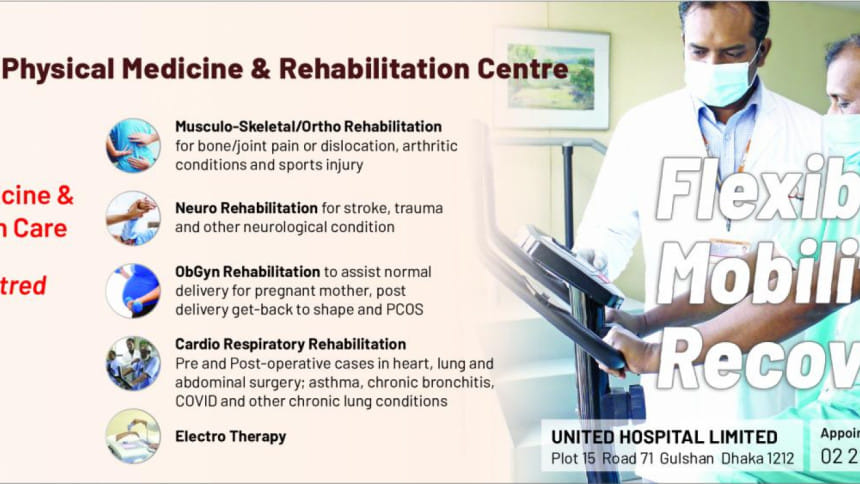Physical medicine and rehabilitation care using a patient-centred approach

Physical medicine and rehabilitation also known as "physiatry" or rehabilitation medicine is a medical specialty that helps people regain bodily functions they lost due to medical conditions or injury. Rehabilitation can help many bodily functions, including bowel and bladder problems, chewing and swallowing, problems thinking or reasoning, movement or mobility, speech, and language.
Many injuries or medical conditions can affect one's ability to function, including brain disorders, such as stroke, multiple sclerosis or cerebral palsy, brain injury or spinal cord injury, long-term (chronic) pain, including back and neck pain, major bone or joint surgery, burns, or limb amputation, severe arthritis becoming worse over time, severe weakness after recovering from a serious illness (such as infection, heart failure or respiratory failure). Children may need rehabilitation services for Down Syndrome or other genetic disorders, muscular dystrophy or other neuromuscular disorders, sensory deprivation disorder, intellectual disability or developmental disorders.
Rehabilitation experts use many tests to evaluate a person's problems and monitor their recovery. The goal of rehabilitation therapy is to teach people how to take care of themselves as much as possible. The focus is often on daily tasks such as eating, bathing, using the bathroom and moving from a wheelchair to a bed. Sometimes, the goal is more challenging, such as restoring full function to one or more parts of the body.
United Hospital Physical Medicine and Rehabilitation centre specialises in patient-centred care to prevent, diagnose, treat and rehabilitate an array of disorders and injuries, helping patients regain function, mobility and independence. We offer physician-led rehabilitation programmes for those whose lives have been affected by an injury, illness or disease. Our experienced physician will give each client a thorough evaluation before prescribing appropriate treatment modules. Here dedicated physical medicine and rehabilitation (physiatry) specialist and the physiotherapist team help patients who have pain, weakness, numbness or other functional issues stemming from an injury or chronic illness that prevents them from leading an active, independent life. This also include sports medicine and injury prevention. For pain management, under musculoskeletal ultrasound guidance, intra-articular injection/nerve blocks is also applied here.
Physical medicine and rehabilitation is a team approach. United Hospital PM&R centre team members consist of doctor (physiatrist) and physiotherapists. Physiatrists are PM&R physicians, who are doctors that specialize in function. Physiatrists specialize in restoring optimal function to people with injuries to the muscles, nerves, bones, joints and ligaments to enforce and restore functional ability and quality of life to those with such physical impairments and disabilities. Physiatrists play an immense role in treating some medical conditions and need a thorough medical knowledge of the pathophysiology and consequence of the disease so as to prevent many of the catastrophes faced by those with disabling ailments.
Physiatrists need to work with other physicians, which may include primary care physicians, pulmonologist, neurologist, neurosurgeons, orthopedic surgeons and many others. They treat the whole person, not just the problem area, says Dr Naima Siddiquee, Specialist Physiatrist of United Hospital.
Talking about post-natal rehabilitation, Dr Naima says, we encourage mothers to resume pelvic floor exercises as soon after the child-birth as possible, regardless of whether they had a vaginal or C-section delivery. We give them advice about posture & back care, pelvic floor and specific abdominal exercises. After delivery of a baby, if mothers do not work to regain their pelvic floor, low back and abdominal muscle strength; they are at increased risk of developing pain or incontinence later and also in subsequent pregnancies.
Samina Afroz, a school teacher of 27, who had her baby delivered at United Hospital says, in the post-natal physiotherapy sessions, I was taught the correct method of pelvic floor exercise. Further I received advice to avoid stooping, twisting or bending over from my waist since abdominal and pelvic floor muscles get weaker as a result of the pregnancy and birth. I had a C-section, so I was advised to not lift anything heavier than the baby for the first 6 weeks.
Dr Naima says, we advise mothers to continue with their pelvic floor exercises until they feel they are completely back to normal. In fact continuing doing these for the rest of life help prevent problems such as stress incontinence, where women leak urine during coughing, laughing or lifting things. These exercises also help protect against a prolapsed uterus or bladder in later life.
People can have rehabilitation in many settings. It often begins while they are still in the hospital, recovering from an illness or injury. After the person leaves the hospital, treatment may continue at hospital's rehabilitation center. Patients are referred to PM&R centre if they have significant orthopedic problems, a spinal cord injury or severe brain injury from stroke or trauma. A full rehabilitation program and treatment plan is sometimes needed to help with medical, physical, social, emotional, and work-related problems. This includes therapy for specific medical problems, advice about setting up their home to maximize their function and safety and also help with wheelchairs, splints and other medical equipment. PM&R treatment may include any combination of the following: medication, physical therapy, occupational therapy, massage, exercise, spinal injections, and more.

 For all latest news, follow The Daily Star's Google News channel.
For all latest news, follow The Daily Star's Google News channel. 



Comments